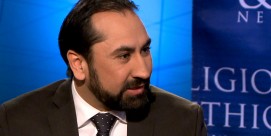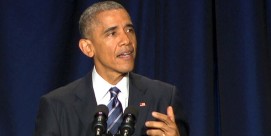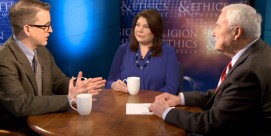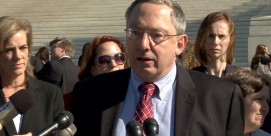Howard Rhodes: Civic Identity and Sacred Values
President Obama concluded his State of the Union Address by claiming that citizenship is based on the idea that “this country only works when we accept certain obligations to one another and to future generations.” Without this robust sense of our duties to complement our rights, the president suggests, we fail to do justice to the victims and heroes of the nation’s enduring struggles.
To fully comprehend our duties, however, we must understand ourselves as inheritors of the founding creed and co-authors of “the next great chapter in our American story.” In this way, the president’s State of the Union Address ends where his Second Inaugural Address began: the question of American civic identity. Is American civic identity sufficiently cohesive, and its national character sufficiently secure, to negotiate the challenges of a global economy while preserving its commitment to equality, fairness, and dignity for all?
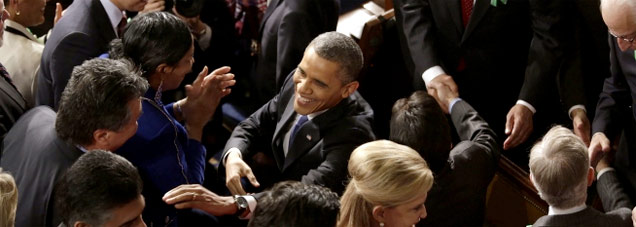
President Obama’s vision of citizenship is one of his most important contributions to public discourse at the beginning of the twenty-first century. It constitutes an important reminder of the role of civic identity and moral purpose in the politics of self-government. It is a vision, however, that presents both perils and opportunities for conscientious citizens of all stripes. On the one hand, the president views the national character as constituted in part by a robust conversation in which ideas about dignity and justice play a crucial role. For religious citizens, this view of democracy as an ongoing contest over sacred values is a refreshing break from views that would minimize or exclude the role these ideas play in our common life. On the other hand, however, the president’s account of citizenship is strongly tied to the purposes of the administrative state. While this view of citizenship may be useful in pushing through a political agenda set by the Democratic (or Republican) Party, it does little to ensure that citizens will be independently organized so as to hold their leaders accountable.
Citizenship, according to the president, is more than a legal status enabling individuals to enjoy certain liberties. It is a constitutive aspect of our identities as members of this republic. It is part of “the way we’re made” and thus capable of inspiring passion and dedication. Like a religious identity, it has a creed but is characterized less by common beliefs in identifiable principles than as a way of life. It combines a quasi-religious concern for dignity and justice with an anti-dogmatic commitment to allowing all citizens to have their say in the politics of our day. Ultimately, the president suggests, civic identity is the wellspring of collective action which enables government to clear obstacles and blunt the vicissitudes of life that frustrate the efforts of ordinary citizens to acquire wealth and live with dignity in just circumstances.
Citizenship thus conceived is inspirational in part because it makes the soldier’s or police officer’s high sense of public purpose available to all citizens. For this sense of purpose to be real, however, it cannot be merely a matter of the aesthetic appreciation of a president’s speech or political ceremony. This would make a person’s relationship to citizenship like a moviegoer’s relationship to soldiering or policing. For this reason, citizenship and civic identity must be conceived as a practice, as something we do rather than something we simply are. Citizens, according to this view, are something we cannot be alone, but must be together in organized activities.
If citizens are poorly organized and lack a cohesive civic identity capable of balancing the imperatives of principle and profit, then their government will be unrepresentative and dominated by corporate interests potentially inimical to dignity and justice. One need not be anti-entrepreneurial to recognize that the corporate interests in this country are always well-organized and expect concentrated benefits from the policies they favor (or concentrated harms from the policies they don’t). Ordinary citizens, however, are loosely organized (if organized at all), and the harms they suffer are frequently diffuse by comparison—a child killed by gun violence here, a neighborhood trapped in intractable poverty there. In the rough-and-tumble of political life, it is axiomatic that concentrated benefits will trump diffuse harms (or vice-versa) every time, especially when the beneficiaries are well-organized.
Princeton religion professor Jeffrey Stout, in his recent book Blessed Are the Organized: Grassroots Democracy in America (Princeton University Press, 2010), argues that “the deepest cultural division present in modern democracies might well be between people who take cost-benefit calculation to be definitive of practical rationality as such and people who use concepts of sacred value and human dignity to defend some aspects of culture from commodification.” Stout notes that most citizens, religious or otherwise, think about the world in terms of sacred values, and that these values impose obligations that cannot be overridden by expediency or wealth maximization. When citizens object to mountaintop removal or other forms of environmental degradation, they do so because such practices threaten values that cannot be quantified in terms of jobs created or dollars earned. When citizens object to deficient, unaffordable health care coverage, they do so because they believe the dignity of the persons affected requires better. All of these claims can be contested. But what should not be overlooked is that these contentions over the relevance of sacred values and mutual obligations are part and parcel of democratic citizenship.
Since the Reagan administration, however, the review of regulatory policy has been guided almost exclusively by cost-benefit analysis. The Obama administration has attempted to make government more responsive to claims about dignity and justice by encouraging attention to these claims in regulatory agencies. In 2011, the president issued Executive Order 13,563 articulating general principles of regulation and regulatory review. Unlike previous executive orders on this issue extending back to Reagan, all of which grounded regulatory review in cost-benefit analysis almost exclusively, President Obama’s order encouraged agencies to consider non-quantifiable values such as “equity, human dignity, fairness, and distributive impacts” in their regulatory efforts.
The addition of these few words seems a small matter, and it may well be. The president’s inclusion of these words, however, in the administration’s guidance for regulatory review provides a foothold at the highest level of regulatory policy for normative claims of the sort often (theoretically) excluded from many liberal accounts of politics. This gesture is mere straw before the wind unless community centers, churches, synagogues, and mosques across the country become, alongside everything else they are, sites of civic education and organization capable of enabling citizens to speak to government with sufficient power to make a difference.
By conceiving the conversation of American citizenship as tied up with claims about dignity and other sacred concepts, President Obama does not pretend that Americans agree about what these concepts mean or how they should influence the laws and policies that govern us. To the contrary, he suggests that tolerance will perpetually be a part of the “common creed” that enables us to keep talking even when we disagree. The commitment to a civic conversation in which controversial sacred values play a part is neither an invitation to political domination by a moral minority, nor a Pollyanna fantasy that a civic creed can displace our ongoing moral disagreements. It is, at bottom, a deeply realistic view of how moral civic discourse has actually progressed. With the exception of the issue of slavery, which required a war to settle, American civic discourse has been remarkably able to sustain the necessary “bonds of affection” even in the face of deep disagreement about important issues.
Howard Rhodes has taught at the University of Iowa and is currently is a J.D. candidate at Duke University School of Law. His most recent commentary for Religion & Ethics NewsWeekly was “On Syria: Just War, Acceptance, and Regret.”


